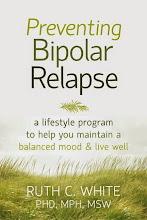 People living with mental illness know that the little pills that come along with sanity make a difference to feeling good or bad. But it is good to know that food, yes food, can also help our brains function at a much more even keel. What we put in our mouth really does matter to whether or not our moods stay in check.
People living with mental illness know that the little pills that come along with sanity make a difference to feeling good or bad. But it is good to know that food, yes food, can also help our brains function at a much more even keel. What we put in our mouth really does matter to whether or not our moods stay in check.First, without thinking on what type of food we should eat, we should generally eat a healthy meal several times a day. That is a meal with lots of color: fruits and vegetables. But what foods and vegetables make our brains healthy while making our bodies happy.
In keeping with one of the principles of this blog, I will not make a long list (I can add more later) nor use technical scientific language nor give you a long page to read. If you know of other nutrients, other research or I have misrepresented something, please let me know by sending me a note in the comments section. And follow me on my Psychology Today blog as well where I write more generally about mental health.
So here are some nutrients to consider. I will acknowledge that I use Vitamin D and Omega 3 supplements in addition to other pharmaceuticals, as recommended by my doctor. I think they make a difference in reducing the amount of medication I need but who knows. My body utilizes these micronutrients for other good things so it can't harm.
1. VITAMIN D. Free from the sun but in the winter its harder to get and the 'stay-out-of-the-sun' recommendations from the dermatologists may be interfering with our manufacture of this very essential micronutrient. One of the side effects of taking anti-epileptic drugs is to reduce Vitamin D in the blood (Ovsiew, 2004) which can lead to osteoporosis in people living with mental illnesses who take atypical anti-psychotics like olanzapine for the treatment of bipolar disorder. At the very least, being in the sun will make you feel better whether science understands exactly how it works or not. Vitamin D3 is found in fatty fish and because it is so important to our bodies it is added to many foods such as milk and some juices.
2. OMEGA 3 Found in cold water fish and seeds such as flaxseed, omega 3 fatty acids are not only great for glowing skin but lubricates our brain's machinery and keeps it running smoothly. Omefa 3s can be found in cold water fish, like salmon and vegetable sources such as flax and chia seed. Jerome Sarris (2011) and a team of researchers did an analysis of studies that looked at 'nutraceuticals' and how their effect on bipolar disorder symptoms and found that though there were mixed effects of omega 3's on symptoms, there was a mostly positive effect on depression but not on mania.
3. COFFEE AND ALCOHOL: Avoid these substances because they have been overwhelmingly proven to alter mood in ways that are unclear and as our moods are already problematic, it is best to avoid these so that we can also get good sleep at night. If you really need a cup of brewed beans to get you started in the morning it is best to drink before noon so that the effects wear off before night.
4. L-TRYPTOPHAN: Sarris et al. (2011) and his team found that this nutrient had a positive impact on moods. This amino acid is used by the brain to make serotonin that is mainly linked to depression. Some foods that contain L-Tryptophan include nuts, seeds, eggs, meat, fish, tomatoes and cheese among other foods.
References
Ovsiew, F. (2004). Anti-epileptic drugs in psychiatry. Journal of Neurology, Neurosurgery and Psychiatry, (75) 12, 1655-1658
Sarris, J., Mischoulon, D., Schweitzer, I. (2011). Adjunctive nutraceuticals with standard pharmacotherapies in bipolar disorder: A systematic review of clinical trials. Bipolar Disorders, 13 (5-6), 454 - 465.




